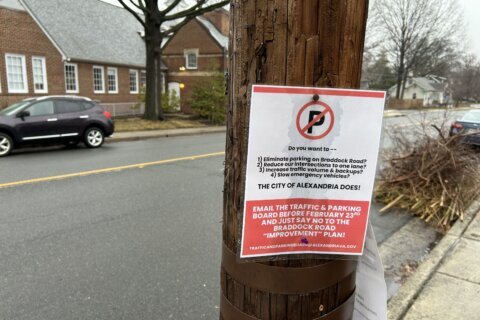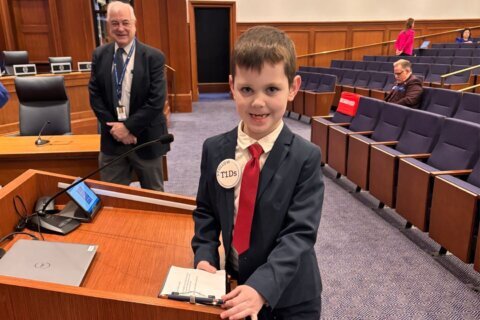Two U.S. Park Police officers, who shot and killed Bijan Ghaisar in 2017 and were indicted in Fairfax County on manslaughter and weapons charges, will have their criminal cases moved out of a Virginia state court and into an Alexandria federal courtroom, a judge ruled Friday.
Officers Alejandro Amaya and Lucas Vinyard were indicted in October 2020 by a Fairfax County grand jury, after the U.S. Justice Department decided to not file criminal charges against them.
The two officers’ lawyers argued Friday before U.S. District Court Judge Claude Hilton that their cases should be moved from Circuit Court in Fairfax to federal court, where they are expected to seek a dismissal of the charges.
Under the “supremacy clause” of the U.S. Constitution, federal law takes precedence over state laws, and federal officers generally cannot be prosecuted for state crimes while carrying out their duties.
The judge said both officers, in seeking to have the case moved to federal court, had made their case with “sufficient particularity.” The judge added: “These are officers of the United States. The circumstances of this case, I believe, have been set forth with particularity. These defendants have a right to exert a defense of immunity.”
Member of the Ghaisar family, including Bijan Ghaisar’s mother, Kelly, gathered after the hearing outside the federal courthouse in Alexandria on Friday.
“Everything has failed the family,” Kelly Ghaisar said. “They are murderers. I am confident we will get justice for Bijan.”
When asked if the family would ask the new leadership of the Justice Department, under President Joe Biden, to reopen the case, Kelly Ghaisar said, “We have lawyers and they should answer that.” She added, “I just hope this Department of Justice will take a look again.”
It’s unclear what steps the Justice Department could or would take to reexamine the case.
Contrasting the recent police shooting of 20-year-old Daunte Wright outside Minneapolis, in which the officer was arrested and charged three days after the shooting, Bijan Ghaisar’s brother-in-law, Kouros Emami, said it appears federal officers are treated differently than local officers.
“If you’re an officer with the federal government, you can just kill with immunity,” he said.
In a joint statement released after the judge’s decision, Virginia Attorney General Mark Herring and Fairfax County Commonwealth’s Attorney Steve Descano, said they were disappointed with the judge’s ruling, adding: “We believe that the Commonwealth must be able to hold people accountable for crimes that they commit in Virginia. That being said, today’s decision will keep this case moving forward toward finally getting justice for Bijan Ghaisar and his family.
We look forward to working together in the future as we continue to fight for fairness, equality, and opportunity in Virginia.”
One of Herring’s deputies argued the state’s case. Before the judge’s ruling, Virginia Deputy Solicitor General Michelle Kallen argued that the supremacy defense statute “does not provide for automatic removal to federal court of any state court action by any federal officer.” Citing previous cases, the state argued the officers’ lawyers “must allege the underlying facts supporting each of the requirements for removal jurisdiction.”
Kallen argued the officers’ motion to remove the case to federal court “fell far short of making their notices of removal clear and specific.”
In her argument, Kallen also sought to widen the issue before the judge, arguing for a state’s right to prosecute a state crime.
“We live in a system of dual sovereignty, where states are entitled to prosecute people who commit crimes within their borders and against their citizens,” she said, adding: “These officers shot a Virginia citizen on Virginia soil.”
Amaya and Vinyard pursued Ghaisar in November 2017, after Ghaisar drove away from a fender-bender in Alexandria. The officers followed Ghaisar down the George Washington Memorial Parkway, signaling for him to pull over.
Twice, Ghaisar stopped. In each case, as the officers approached his vehicle with guns drawn, Ghaisar drove off.
At the third stop, in a residential neighborhood, when Ghaisar’s Jeep moved forward, the Park Police officers shot Ghaisar. Dashcam video from a Fairfax County police cruiser captured the sound of nine shots.
In November 2019, the Justice Department said it could not prove beyond a reasonable doubt that Amaya and Vinyard willfully violated Ghaisar’s civil rights, and that it would have not been able to disprove the officers’ claims they acted in self-defense.
However, Descano, the Fairfax County commonwealth’s attorney, obtained indictments against Amaya and Vinyard. Each is charged with involuntary manslaughter and reckless discharge of a firearm.
The officers’ attorneys argued the justification for the removal to federal court is clear; the officers’ actions met the Supreme Court’s requirement of being “necessary and proper” to perform their federal duties.
Lawyers for the state counter with citations from previous Supreme Court opinions that say state officers’ prosecutorial discretion is a valuable feature of the constitutional system.
“Here, after the federal government declined to prosecute, the Commonwealth’s Attorney for the County of Fairfax took up the mantle, ‘carefully weigh[ed] the benefits of a prosecution against the evidence need to convict,’ convened a grand jury (which concluded there was enough evidence to prosecute), and chose to bring the case,” wrote Deputy Solicitor General Michelle Kallen.
Judge Hilton also is the judge in a wrongful-death lawsuit against Park Police, which was brought by Ghaisar’s family. That case has been paused, while the criminal jurisdictional matter is addressed.
Lawyers for Amaya and Vinyard are next expected to file motions to dismiss the criminal charges, claiming Supremacy Clause Immunity, which the judge would consider after hearing witness and expert testimony.
The officers will remain free on bond, with travel restrictions, until a bond hearing May 14. The officers’ lawyers requested that all restrictions be removed. But the judge decided to leave them in place until the next hearing.









